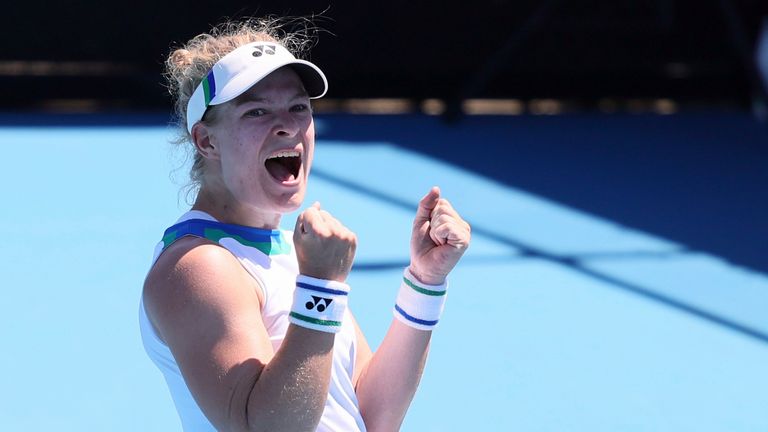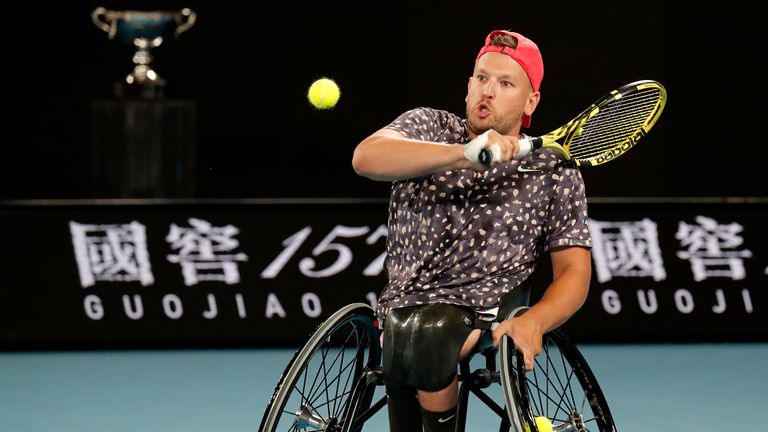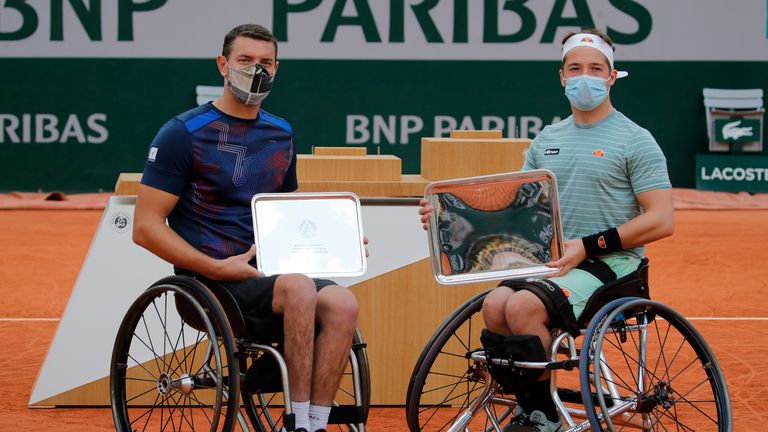Australian Open 2021: Five things we learned from the wheelchair draw in Melbourne
Dylan Alcott, Gordon Reid, Alfie Hewett and Diede de Groot headline our talking points from the 2021 Australian Open; what's next for wheelchair tennis in sport's greatest time of uncertainty?
Wednesday 24 February 2021 12:49, UK
It's been an Australian Open like no other but one thing the tournament has once again done is shine a spotlight on wheelchair tennis and the athletes who are at the top of the game.
In 2021, Melbourne Park set the stage for Dylan Alcott to make it a magnificent seven when it came to Australian Open singles titles, Gordon Reid and Alfie Hewett get their 10th Grand Slam doubles title together, and Joachim Gerard claimed his long-overdue first major singles title.
But beyond the winners of the titles won what else did we learn from the Aussie Summer Series as three weeks of wheelchair tennis action Down Under came to a close.
Kings of the tiebreak
You have to go back to Wimbledon 2019 to see a partnership other than that of Reid and Hewett's on a Slam doubles trophy, and while the titles have been building up so has their reputation of being able to come through tense tie-break situations - whether they happen at the end of a set or the match is decided on one.
Speaking to Sky Sports after their doubles final, Hewett said, "When it comes to those moments we are just really clinical, we're consistent, we dig deep and we fight for each other."
Reid echoed his doubles partner's thoughts, "I mean ideally we wouldn't need to go to tie breaks, we don't do it on purpose I promise. But because we've come through so many of them in the last few years we really back ourselves when we're in that situation."
A Midnight Masterclass
The final which saw Dylan Alcott win his seventh successive Australian Open quad singles title was originally scheduled on Rod Laver Arena after the men's quarter-final between Rafael Nadal and Stefanos Tsitsipas.
But as that match headed into a fifth set the quads singles final was moved to Margaret Court Arena.
Alcott had come through a tough semi-final match-up against Niels Vink and was faced with Sam Schroder, another of the Netherlands' rising stars. The clock may have shown it was past midnight but Alcott's performance was dominant and saw him take the title in straight sets 6-1, 6-0.
"I think the final was a good signal that my mental game is really strong," he said. "I think being assured of who you are is an important trait too and I think I also shy away from how hard I work.
"You might know me as the radio guy goes to festivals, and me, this happy guy, but I also bust my ass five hours a day every single day when no one is watching."
What's the score?
We are used to seeing multiple Grand Slam singles and doubles champion Diede de Groot having the opportunity to celebrate twice when it comes to the majors, although not usually in the same match.
In what was a tight head-to-head between her and Yui Kamiji, there was a bit of unexpected added tension with confusion as to whether the final breaker went to seven or 10.
And after thinking at 7-4 in the final set tie-break she had won another Slam singles title to add to her growing collection, De Groot had to regroup and in the end, a slightly less energetic celebration accompanied her finally closing the final out on a match tie-break 10-4.
"It was really hard," she said. "I don't think anyone out there - not my opponent, not the people watching, nobody at home, not myself, knew that it was a 10-point tie-break. I really had to refocus and go back and think to myself I did it to 7-4, I can do it to 10, I just have to be tough. I was proud of myself for doing that and finishing it.
Draw Developments
The Australian Open has always been an event where we have seen the development of wheelchair tennis at the majors progress considerably.
In what was described by Britain's Andy Lapthorne at the start of this year's draw as "a massive step forward", the quads were given an extended draw size of eight, one equal to that of the men's and women's open division which saw them also get equal prize money.
But with the divisions equal in draw size, at least at this Slam, are there other steps that can be made at these major events to grow the game?
For a while there has been talk of it being time to extend the draws to the top 16 players, but after making the doubles final with South Africa's KG Montjane, Britain's Lucy Shuker is passionate about seeing another development that could help grow the game too.
"I just think you know in the able-bodied game there's singles and doubles entries but at the moment in wheelchair tennis everything is based on singles ranking," she told Sky Sports. "The way the game is moving and developing and the depth we have in the game as well it would be great to see it.
"At the moment I don't qualify directly into a Slam on my singles ranking and yet here I've made it to a doubles final with KG and we were second seeds."
Beyond the Slams?
After the Australian Open and with countries of the world still in various states of restrictions and lockdown because of coronavirus, what happens next on the UNIQLO wheelchair tennis tour is slightly more uncertain.
The next Grand Slam wheelchair tennis we should see being played is Roland Garros, providing the pandemic allows, while the ATP 500 in Rotterdam next week will also welcome some of the top men's open division players to compete once again.
In the UK, the LTA are hoping to run an ITF2 event in mid-March in Loughborough and their planned summer of tennis includes running events alongside ATP and WTA tournaments as well as The British Open in Nottingham.
But elsewhere we are seeing other tour events being rescheduled or cancelled, something which concerns the USA's David Wagner.
Speaking to Sky Sports he said, "Points may drop off people's rankings and that's going to impact who gets into Grand Slams, it impacts who moves forward playing where, it'll impact the seedings within the Paralympics - there's a whole bunch of ramifications.
"Of course a solution is not easy, and to put it in perspective, we are still dealing with coronavirus so to have been out here playing and doing our jobs is a privilege a lot of people don't have right now and I'm grateful for having that opportunity. But we have to come together as a group and figure out a solution as the tour is more than just the 24 players you've seen here at the Grand Slam. I think all the players are willing to help out in some way. I know I am."




